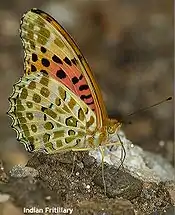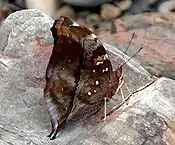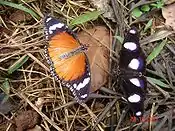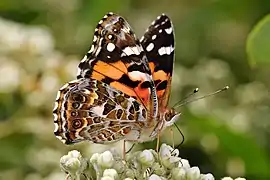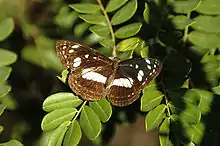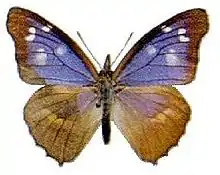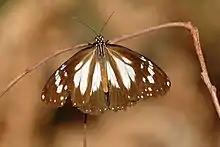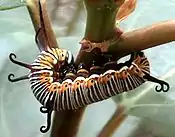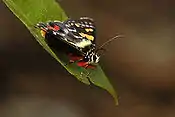List of butterflies of Australia
Australia has more than 400 species of butterfly, the majority of which are continental species, and more than a dozen endemic species from remote islands administered by various Australian territorial governments. The largest butterflies in the world are endemic to the Australasian realm. They are the birdwings—Ornithoptera and other genera—of the tribe Troidini of the swallowtail butterfly family, Papilionidae.[1]
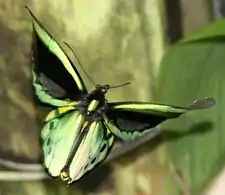
Papilionidae: swallowtails
Family: Papilionidae (swallowtails) — 18+2 species [*2 non-continental species]
Papilioninae
- subfamily: Papilioninae
- tribe: Leptocircini (formerly Graphiini)
- genus: Protographium
- Four-barred swordtail, Protographium leosthenes (Doubleday, 1846)[2] — pictured
- genus: Graphium (swordtails)
- Five-barred or chain swordtail, Graphium aristeus (Stoll, 1780)[4]
- Macleay's swordtail, Graphium macleayanus (Leach, 1814)[5]
- Blue triangle, Graphium sarpedon (Linnaeus, 1758)[7] — pictured
- Pale triangle, Graphium eurypylus (Linnaeus, 1758)[7]
- G. e. lycaon (C. & R. Felder, 1865)[8]
- G. e. nyctimus (Waterhouse & Lyell, 1914)[9]
- G. e. lycanoides (Rothschild, 1895)[10]
- Green triangle, Graphium macfarlanei (Butler, 1877)[11]
- Green-spotted triangle, Graphium agamemnon (Linnaeus, 1758)[7]
- genus: Protographium
- tribe: Papilionini (fluted swallowtails)
- genus: Papilio (Linnaeus, 1758)[7]
- Dainty swallowtail, Papilio anactus (W. S. Macleay, 1826)[12]
- Orchard swallowtail, Papilio aegeus (Donovan, 1805)[13] — pictured
- Ambrax swallowtail, Papilio ambrax (Boisduval, 1832)[15]
- Fuscus swallowtail, Papilio fuscus (Goeze, 1779)[16]
- P. f. canopus (Westwood, 1842)[17]
- P. f. capaneus (Westwood, 1843)[18]
- P. f. indicatus (Butler, 1876)[19]
- Ulysses swallowtail, Papilio ulysses (Linnaeus, 1758)[7] — pictured
- Chequered swallowtail, Papilio demoleus (Linnaeus, 1758)[7]
- *Christmas swallowtail, Papilio memnon (Linnaeus, 1758)[7] [*native to Christmas Island]
- *Norfolk swallowtail, Papilio amynthor (Boisduval, 1859)[20] [*native to Norfolk Island]
- genus: Papilio (Linnaeus, 1758)[7]
- tribe: Troidini (Aristolochia-eating swallowtails)
- genus: Cressida
- Clearwing swallowtail, Cressida cressida (Fabricius, 1775)[21]
- C. c. cressida (Fabricius, 1775)[21]
- genus: Ornithoptera (birdwings)
- Richmond birdwing, Ornithoptera richmondia (Gray, 1853)[22]
- Cairns birdwing, Ornithoptera euphorion (Gray, 1853)[22] — pictured
- New Guinea or common green birdwing, Ornithoptera priamus (Linnaeus, 1758)[7]
- genus: Pachliopta
- Red-bodied swallowtail, Pachliopta polydorus (Linnaeus, 1763)[25]
- genus: Cressida
- tribe: Leptocircini (formerly Graphiini)
Pieridae: whites and yellows
family: Pieridae (whites and yellows) — 35+2+1 species [†1 introduced species]
Pierinae: whites
- subfamily: Pierinae (whites)
- tribe: Elodinini
- genus: Elodina (pearl-whites)
- Southern pearl-white, Elodina angulipennis (H. Lucas, 1852)[26]
- Cape York pearl-white, Elodina claudia (de Baar & Hancock, 1993)[27]
- Narrow-winged pearl-white, Elodina padusa (Hewitson, 1853)[28]
- Striated pearl-white, Elodina parthia (Hewitson, 1853)[28]
- Delicate pearl-white, Elodina perdita (Miskin, 1889)[29]
- Glistening pearl-white, Elodina queenslandica (de Baar & Hancock, 1993)[27]
- Small pearl-white, Elodina walkeri (Butler, 1898)[30]
- genus: Elodina (pearl-whites)
- tribe: Leptosiaini
- genus: Leptosia
- Black-spotted white, Leptosia nina (Fabricius, 1793)[31] — pictured right
- genus: Leptosia
- tribe: Pierini
- genus: Appias (albatrosses)
- Orange albatross, Appias ada (Waterhouse & Lyell, 1914)[9]
- A. a. caria (Waterhouse & Lyell, 1914)[9]
- White or common albatross, Appias albina (Boisduval, 1836)[32] — pictured right
- A. a. albina (Boisduval, 1836)[32]
- Blue albatross, Appias celestina (Boisduval, 1832)[15]
- Grey albatross, Appias melania (Fabricius, 1775)[21]
- Yellow albatross, Appias paulina (Cramer, 1777)[4]
- A. p. ega (Boisduval, 1836)[32]
- Striped albatross, Appias olferna (Swinhoe, 1890)[33]
- genus: Pieris
- †Small cabbage white, Pieris rapae (Linnaeus, 1758)[7] [†introduced species] — pictured right
- genus: Belenois (formerly Anaphaeis)
- Caper white, Belenois java — pictured right
- genus: Cepora
- Caper gull, Cepora perimale (Donovan, 1805)[13]
- C. p. scyllara (W. S. Macleay, 1826)[12]
- genus: Delias (Jezebels)
- Spotted Jezebel, Delias aganippe (Donovan, 1805)[13]
- Scarlet Jezebel, Delias argenthona (Fabricius, 1793)[31] — pictured right
- D. a. argenthona (Fabricius, 1793)[31]
- Golden Jezebel, Delias aruna (Boisduval, 1832)[15]
- D. a. inferna (Butler, 1871)[34]
- Yellow-banded Jezebel, Delias ennia (Wallace, 1867)[35]
- Imperial Jezebel, Delias harpalyce (Donovan, 1805)[13]
- Red-banded Jezebel, Delias mysis (Fabricius, 1775)[21] — pictured right
- D. m. mysis (Fabricius, 1775)[21]
- D. m. aestiva (Butler, 1897)[38]
- D. m. onca (Fruhstorfer, 1910)[39]
- Black Jezebel, Delias nigrina (Fabricius, 1775)[21]
- Yellow-spotted Jezebel, Delias nysa (Fabricius, 1775)[21]
- genus: Appias (albatrosses)
- tribe: Elodinini
Coliadinae: yellows
- subfamily: Coliadinae (yellows)
- genus: Catopsilia (migrants or emigrants)
- White migrant, Catopsilia pyranthe (Linnaeus, 1758)[7]
- C. p. crokera (W. S. Macleay, 1826)[12]
- Lemon migrant, Catopsilia pomona (Fabricius, 1775)[21] — pictured right
- Orange migrant, Catopsilia scylla (Linnaeus, 1764)[7]
- C. s. etesia (Hewitson, 1867)[40]
- Yellow migrant, Catopsilia gorgophone (Boisduval, 1836)[32]
- C. g. gorgophone (Boisduval, 1836)[32]
- genus: Eurema (grass-yellows)
- No-brand grass-yellow, Eurema brigitta (Stoll, 1780)[4] — pictured right
- Lined grass-yellow, Eurema laeta (Boisduval, 1836)
- E. l. sana (Butler, 1877)[11]
- Pink grass-yellow, Eurema herla (W. S. Macleay, 1826)[12]
- Small grass-yellow, Eurema smilax (Donovan, 1805)[13]
- E. s. smilax (Donovan, 1805)[13]
- Broad-margined grass-yellow, Eurema puella (Boisduval, 1832)[15]
- Scalloped grass-yellow, Eurema alitha (C. & R. Felder, 1832)[41]
- Large grass-yellow, Eurema hecabe (Linnaeus, 1758)[7] — pictured right
- *Three-spot grass yellow, Eurema blanda (Boisduval, 1836)[32] [*native to Christmas and Darnley Islands]
- genus: Catopsilia (migrants or emigrants)
Riodinidae: metalmarks
family: Riodinidae (metalmarks) — 1 species
Nemeobiinae
- subfamily: Nemeobiinae
- genus: Praetaxila
- Harlequin metalmark, Praetaxila segecia (Hewitson, 1861)[43] — pictured right
- P. s. punctaria (Fruhstorfer, 1914)[44]
- genus: Praetaxila
Lycaenidae: gossamer-winged blues and coppers
family: Lycaenidae (gossamer-winged blues and coppers) — 142+7 species
Miletinae: harvesters
Theclinae: hairstreaks
- subfamily: Theclinae (hairstreaks)
- tribe: Luciini
- genus: Lucia
- Chequered copper, Lucia limbaria (Swainson, 1833)[47]
- genus: Paralucia
- Bright copper, Paralucia aurifera (Blanchard, 1848)[48]
- Fiery copper, Paralucia pyrodiscus (Doubleday, 1847)[23]
- P. p. lucida (Crosby, 1951)[49]
- Purple or Bathurst copper, Paralucia spinifera (Edwards & Common, 1978)[50] — pictured right
- genus: Pseudodipsas
- Bright forest-blue, Pseudodipsas cephenes (Hewitson, 1874)[51]
- Dark forest-blue, Pseudodipsas eone (C. & R. Felder, 1865)[52]
- P. e. iole (Waterhouse & Lyell, 1914)[9]
- genus: Acrodipsas (ant-blues)
- Black-veined ant-blue, Acrodipsas arcana (Miller & Edwards, 1978)[53]
- Golden ant-blue, Acrodipsas aurata (Sands, 1997)[54]
- Bronze ant-blue, Acrodipsas brisbanensis (Miskin, 1884)[36]
- Copper ant-blue, Acrodipsas cuprea (Sands, 1965)[55]
- Decima ant-blue, Acrodipsas decima Miller and Lane, 2004
- Black ant-blue, Acrodipsas hirtipes (Sands, 1980)[56]
- Mangrove or Illidge's ant-blue, Acrodipsas illidgei (Waterhouse & Lyell, 1914)[9] — pictured right
- Grey ant-blue, Acrodipsas melania (Sands, 1980)[56] — pictured right
- Brown ant-blue, Acrodipsas mortoni (Sands, Miller & Kerr, 1997)[57]
- Small ant-blue, Acrodipsas myrmecophila (Waterhouse & Lyell, 1913)[58]
- genus: Hypochrysops (jewels)
- Copper jewel, Hypochrysops apelles (Fabricius, 1775)[21]
- H. a. apelles (Fabricius, 1775)[21]
- Apollo jewel, Hypochrysops apollo (Miskin, 1891)[59]
- Yellow jewel, Hypochrysops byzos (Boisduval, 1832)[15] — pictured right
- Splendid jewel, Hypochrysops cleon (Grose-Smith, 1900)[61]
- Cyane jewel, Hypochrysops cyane (Waterhouse & Lyell, 1914)[9]
- Moonlight jewel, Hypochrysops delicia (Hewitson, 1875)[62]
- Silky jewel, Hypochrysops digglesii (Hewitson, 1874)[51]
- Amethyst jewel, Hypochrysops elgneri (Waterhouse & Lyell, 1909)[64]
- Mangrove jewel, Hypochrysops epicurus (Miskin, 1876)[66] — pictured right
- Turquoise jewel, Hypochrysops halyaetus (Hewitson, 1874)[51] — pictured right
- Paradise jewel, Hypochrysops hippuris (Hewitson, 1874)[51]
- H. h. nebulosis (Sands, 1986)[67]
- Fiery jewel, Hypochrysops ignita (Leach, 1814)[5]
- H. i. ignita (Leach, 1814)[5]
- H. i. chrysonotus (Grose-Smith, 1899)[68]
- H. i. erythina (Waterhouse & Lyell, 1914)[9]
- H. i. oliffi (Miskin, 1889)[5]
- Coral jewel, Hypochrysops miskini (Waterhouse, 1903)[63]
- H. m. miskini (Waterhouse, 1903)[63]
- Narcissus jewel, Hypochrysops narcissus (Fabricius, 1775)[21] — pictured right
- Bulloak jewel, Hypochrysops piceata (Kerr, Macqueen & Sands, 1969)[70]
- Royal jewel, Hypochrysops polycletus (Linnaeus, 1758)[7]
- H. p. rovena (Druce, 1891)[71]
- Peacock jewel, Hypochrysops pythias (C. & R. Felder, 1865)[8]
- H. p. euclides (Miskin, 1889)[29]
- Green-banded jewel, Hypochrysops theon (C. & R. Felder, 1865)[8]
- genus: Philiris (moonbeams)
- Azure moonbeam, Philiris azule (Wind & Clench, 1947)[72]
- Large moonbeam, Philiris diana (Waterhouse & Lyell, 1914)[9]
- Bicolour moonbeam, Philiris fulgens (Grose, Smith & Kirby, 1897)[73]
- P. f. kurandae (Waterhouse, 1903)[63]
- Purple moonbeam, Philiris innotatus (Miskin, 1874)[74]
- Blue moonbeam, Philiris nitens (Grose-Smith, 1898)[75]
- Sapphire moonbeam, Philiris sappheira (Sands, 1980)[56]
- White-margined moonbeam, Philiris ziska (Grose-Smith, 1898)[75]
- genus: Lucia
- tribe: Arhopalini
- genus: Arhopala (oak-blues)
- Arhopala eupolis (Miskin, 1890)[76]
- Bright oak-blue, Arhopala madytus (Fruhstorfer, 1914)[44]
- Shining oak-blue, Arhopala micale (Blanchard, 1848)[48]
- A. m. amphis (Waterhouse, 1942)[77]
- White oak-blue, Arhopala wildei (Miskin, 1891)[59]
- A. w. wildei (Miskin, 1891)[59]
- genus: Arhopala (oak-blues)
- tribe: Ogyrini
- genus: Ogyris (azures)
- Dark purple azure, Ogyris abrota (Westwood, 1851)[78]
- Sapphire azure, Ogyris aenone (Waterhouse, 1902)[79]
- Satin azure, Ogyris amaryllis (Hewitson, 1862)[80]
- Bright purple azure, Ogyris barnardi (Miskin, 1890)[76]
- Southern purple azure, Ogyris genoveva (Hewitson, 1853)[28]
- Golden azure, Ogyris ianthis (Waterhouse, 1900)[81]
- Large bronze azure, Ogyris idmo (Hewitson, 1862)[80]
- Orange-tipped azure, Ogyris iphis (Waterhouse & Lyell, 1914)[9]
- Broad-margined azure, Ogyris olane (Hewitson, 1862)[80]
- Silky azure, Ogyris oroetes (Hewitson, 1862)[80]
- Small bronze azure, Ogyris otanes (C. & R. Felder, 1865)[8]
- Arid bronze azure, Ogyris subterrestris (Field, 1999)[82]
- Northern purple azure, Ogyris zosine (Hewitson, 1853)[28]
- genus: Ogyris (azures)
- tribe: Zesiini (hairstreaks)
- genus: Jalmenus
- Inland hairstreak, Jalmenus aridus (Graham & Moulds, 1988)[83]
- Turquoise hairstreak, Jalmenus clementi (Druce, 1902)[84]
- Emerald hairstreak, Jalmenus daemeli (Semper, 1879)[85]
- Northern hairstreak, Jalmenus eichhorni (Staudinger, 1888)[86]
- Imperial hairstreak, Jalmenus evagoras (Donovan, 1805)[13]
- Amethyst hairstreak, Jalmenus icilius (Hewitson, 1865)[87]
- Jalmenus eubulus Miskin, 1876[66]
- Stencilled hairstreak, Jalmenus ictinus (Hewitson, 1865)[87]
- Varied hairstreak, Jalmenus inous (Hewitson, 1865)[87]
- Waterhouse's hairstreak, Jalmenus lithochroa (Waterhouse, 1903)[63]
- Macqueen's hairstreak, Jalmenus pseudictinus (Kerr & Macqueen, 1967)[89]
- genus: Pseudalmenus
- Silky hairstreak, Pseudalmenus chlorinda (Blanchard, 1948)[48]
- genus: Jalmenus
- tribe: Hypolycaenini
- genus: Hypolycaena
- Orchid flash, Hypolycaena danis (C. & R. Felder, 1865)[8]
- H. d. turneri (Waterhouse, 1903)[63]
- Black-spotted flash, Hypolycaena phorbas (Fabricius, 1793)[31]
- genus: Hypolycaena
- tribe: Deudorigini
- tribe: Luciini
- genus: Deudorix
- Dark cornelian, Deudorix epijarbas (Moore, 1858)[91] — pictured right
- Bright cornelian, Deudorix diovis (Hewitson, 1863)[92]
- Orange-lobed flash, Deudorix epirus (C. Felder, 1860)[93]
- D. e. agimar (Fruhstorfer, 1908)[69]
- White-spotted flash, Deudorix democles (Miskin, 1884)[36]
- D. d. democles (Miskin, 1884)[36]
- Princess flash, Deudorix smilis (Hewitson, 1863)[92]
- D. s. dalyensis (le Souëf & Tindale, 1970)[94]
- genus: Rapala
- Indigo flash, Rapala varuna (Horsfield, 1829)[95] — pictured right
- R. v. simsoni (Miskin, 1874)[74]
- genus: Bindahara
- Sword-tailed flash, Bindahara phocides (Fabricius, 1793)[31]
- B. p. yurgama (Couchman, 1965)[6]
- genus: Deudorix
Polyommatinae: blues
- subfamily: Polyommatinae (blues)
- tribe: Candalidini
- genus: Candalides (pencil– and dusky-blues)
- Shining pencil-blue, Candalides helenita (Semper, 1879)[85]
- C. h. helenita (Semper, 1879)[85]
- Trident pencil-blue, Candalides margarita (Semper, 1879)[85]
- C. m. margarita (Semper, 1879)[85]
- Northern pencil-blue, Candalides gilberti (Waterhouse, 1903)[63]
- Common pencil-blue, Candalides absimilis (C. Felder, 1862)[96]
- Dark pencil-blue, Candalides consimilis (Waterhouse, 1942)[77]
- C. c. consimilis (Waterhouse, 1942)[77]
- C. c. goodingi (Tindale, 1965)[97]
- C. c. toza (Kerr, 1967)[98]
- Copper pencil-blue, Candalides cyprotus (Olliff, 1886)[99]
- Varied dusky-blue, Candalides hyacinthina (Semper, 1879)[85]
- C. h. hyacinthina (Semper, 1879)[85]
- C. h. simplexa (Tepper, 1882)[101]
- C. h. gilesi (Williams & Bollam, 2001)[102]
- Twin dusky-blue, Candalides geminus (Edwards & Kerr, 1978)[103]
- Small dusky-blue, Candalides erinus (Fabricius, 1775)[21]
- C. e. erinus (Fabricius, 1775)[21]
- Blotched dusky-blue, Candalides acasta (Cox, 1873)[104]
- Spotted dusky-blue, Candalides delospila (Waterhouse, 1903)[63]
- Yellow-spotted blue, Candalides xanthospilos (Hübner, 1817)[105]
- Rayed blue, Candalides heathi (Cox, 1873)[104]
- Golden-rayed blue, Candalides noelkeri (Braby & Douglas, 2004)[107]
- genus: Nesolycaena (opals)
- genus: Candalides (pencil– and dusky-blues)
- tribe: Lycaenestheni
- genus: Anthene (ciliate-blues)
- Dark ciliate-blue, Anthene seltuttus (Röber, 1886)[111]
- A. s. affinis (Waterhouse & RE Turner, 1905)[112]
- Pale ciliate-blue, Anthene lycaenoides (C. Felder, 1860)[93]
- A. l. godeffroyi (Semper, 1879)[85]
- genus: Anthene (ciliate-blues)
- tribe: Polyommatini
- genus: Petrelaea
- Mauve line-blue, Petrelaea tombugensis (Röber, 1886)[111]
- genus: Nacaduba
- Large purple line-blue, Nacaduba berenice (Herrich-Schäffer, 1869)[113]
- N. b. berenice (Herrich-Schäffer, 1869)[113]
- White-banded line-blue, Nacaduba kurava (Moore, 1858)[91]
- Two-spotted line-blue, Nacaduba biocellata (C. & R. Felder, 1865)[8]
- N. b. biocellata (C. & R. Felder, 1865)[8]
- Green-banded line-blue, Nacaduba cyanea (Cramer, 1775)[4]
- *Violet line-blue, Nacaduba calauria (C. Felder, 1860)[93] [*native to Dauan and Murray Islands]
- N. c. calauria (C. Felder, 1860)[93]
- *Bold line-blue, Nacaduba pactolus (C. Felder, 1860)[93] [*native to Darnley and Murray Islands]
- genus: Erysichton
- Hairy line-blue, Erysichton lineata (Murray, 1874)[114]
- E. l. lineata (Murray, 1874)[114]
- Marbled line-blue, Erysichton palmyra (C. Felder, 1860)[93]
- E. p. tasmanicus (Miskin, 1890)[76]
- genus: Danis
- Large green-banded blue, Danis danis (Cramer, 1775)[4]
- genus: Nothodanis
- *Dark green-banded blue, Nothodanis schaeffera (Eschscholtz, 1821)[115] [*native to Murray Island]
- genus: Psychonotis
- Small green-banded blue, Psychonotis caelius (C. Felder, 1860)[93] — query this one
- P. c. taygetus (C. & R. Felder, 1865)[8]
- genus: Prosotas
- Purple line-blue, Prosotas dubiosa (Semper, 1879)[85]
- P. d. dubiosa (Semper, 1879)[85]
- Short-tailed line-blue, Prosotas felderi (Murray, 1874)[114]
- Long-tailed line-blue, Prosotas nora (Waterhouse & Lyell, 1914)[9]
- P. n. auletes (Waterhouse & Lyell, 1914)[9]
- *Gracile line-blue, Prosotas gracilis (Röber, 1886)[111] [*native to Dauan Island]
- genus: Catopyrops
- Papuan line-blue, Catopyrops ancyra (Waterhouse & Lyell, 1914)[9]
- C. a. mysia (Waterhouse & Lyell, 1914)[9]
- Speckled line-blue, Catopyrops florinda (Butler, 1877)[11]
- genus: Ionolyce
- Bronze line-blue, Ionolyce helicon (Waterhouse & Lyell, 1914)[9]
- I. h. hyllus (Waterhouse & Lyell, 1914)[9]
- genus: Theclinesthes
- Bitter-bush blue, Theclinesthes albocincta (Waterhouse, 1903)[63]
- Western bitter-bush blue, Theclinesthes hesperia (Sibatani & Grund, 1978)[116]
- Wattle blue, Theclinesthes miskini (T. P. Lucas, 1889)[117]
- T. m. miskini (T. P. Lucas, 1889)[117]
- T. m. eucalypti (Sibatani & Grund, 1978)[116]
- T. m. arnoldi (Fruhstorfer, 1916)[118]
- Cycad blue, Theclinesthes onycha (Hewitson, 1865)[87]
- Saltbush blue, Theclinesthes serpentata (Herrich-Schäffer, 1869)[113]
- Samphire blue, Theclinesthes sulpitius (Miskin, 1890)[76]
- genus: Sahulana
- Glistening line-blue, Sahulana scintillata (T. P. Lucas, 1889)[117]
- genus: Neolucia (heath-blues)
- Fringed heath-blue, Neolucia agricola (Westwood, 1851)[78]
- N. a. agricola (Westwood, 1851)[78]
- N. a. insulana (Waterhouse & Lyell, 1914)[9]
- N. a. occidens (Waterhouse & Lyell, 1914)[9]
- Montane heath-blue, Neolucia hobartensis (Miskin, 1890)[76]
- Dull heath-blue, Neolucia mathewi (Miskin, 1890)[76]
- genus: Jamides (ceruleans)
- White-banded cerulean, Jamides aleuas (C. & R. Felder, 1865)[8]
- J. a. coelestis (Miskin, 1891)[59]
- Shining cerulean, Jamides amarauge (Druce, 1891)[71]
- *King cerulean, Jamides bochus (Stoll, 1782)[4] [*native to Christmas Island]
- *Papuan cerulean, Jamides nemophila (Butler, 1876)[19] [*native to Darnley Island]
- Pale cerulean, Jamides cyta (Boisduval, 1832)[15]
- J. c. claudia (Waterhouse & Lyell, 1914)[9]
- Purple cerulean, Jamides phaseli (Mathew, 1889)[120]
- genus: Catochrysops (pea-blues)
- Cobalt pea-blue, Catochrysops amasea (Waterhouse & Lyell, 1914)[9]
- C. a. amasea (Waterhouse & Lyell, 1914)[9]
- Pale pea-blue, Catochrysops panormus (C. Felder, 1860)[93]
- genus: Lampides
- Long-tailed pea-blue, Lampides boeticus (Linnaeus, 1767)[122]
- genus: Leptotes (synonyms Tarucus and Syntarucus)
- Plumbago blue, Leptotes plinius (Fabricius, 1793)[31]
- L. p. pseudocassius (Murray, 1873)[123]
- genus: Zizeeria
- Spotted grass-blue, Zizeeria karsandra (Moore, 1865)[124]
- genus: Zizina
- Common grass-blue, Zizina labradus (Godart, 1824)[125]
- *Lesser grass-blue, Zizina otis (Fabricius, 1787)[126] [*native to Christmas Island]
- genus: Famegana
- Black-spotted grass-blue, Famegana alsulus (Herrich-Schäffer, 1869)[113]
- F. a. alsulus (Herrich-Schäffer, 1869)[113]
- genus: Zizula
- Dainty grass-blue, Zizula hylax (Fabricius, 1775)[21]
- Z. h. attenuata (T. P. Lucas, 1890)[127]
- genus: Everes
- Orange-tipped pea-blue, Everes lacturnus (Godart, 1824)[125]
- E. l. australis (Couchman, 1962)[128]
- genus: Pithecops
- Pied blue, Pithecops dionisius (Boisduval, 1832)[15]
- P. d. dionisius (Boisduval, 1832)[15]
- genus: Neopithecops
- Devil's blue, Neopithecops lucifer (Röber, 1886)[111]
- N. l. heria (Fruhstorfer, 1919)[129]
- genus: Megisba
- Small pied blue, Megisba strongyle (C. Felder, 1860)[93]
- M. s. nigra (Miskin, 1890)[76]
- genus: Udara
- Delicate blue, Udara tenella (Miskin, 1891)[59]
- genus: Euchrysops
- Spotted pea-blue, Euchrysops cnejus (Fabricius, 1798)[130]
- E. c. cnidus (Waterhouse & Lyell, 1914)[9]
- genus: Freyeria
- Jewelled grass-blue, Freyeria putli (Kollar, 1844)[131]
- F. p. putli (Kollar, 1844)[131]
- genus: Petrelaea
- tribe: Candalidini
Nymphalidae: brush– or four-footed
family: Nymphalidae (brush– or four-footed) — 81+6 species
Morphinae
- subfamily: Morphinae
- tribe: Amathusiini
- genus Taenaris
- Pearl owl, Taenaris artemis (Snellen van Vollenhoven, 1860)[132]
- T. a. jamesi (Butler, 1876)[19]
- *Silky owl, Taenaris catops (Westwood, 1851)[78] [*native to Saibai and Darnley Islands]
- genus Taenaris
- tribe: Amathusiini
Satyrinae
- subfamily: Satyrinae
- tribe: Biini
- subtribe: Melanititi
- genus: Melanitis
- Evening brown, Melanitis leda (Linnaeus, 1758)[7] — pictured right
- M. l. bankia (Fabricius, 1775)[21]
- *Banded evening brown, Melanitis amabilis (Boisduval, 1832)[15] [*native to Darnley Island]
- *Papuan evening brown, Melanitis constantia (Cramer, 1777)[4] [*native to Murray Island]
- genus: Melanitis
- subtribe: Melanititi
- tribe: Elymniini
- subtribe: Elymniiti
- genus: Elymnias
- Palmfly, Elymnias agondas (Boisduval, 1832)[15]
- E. a. australiana (Fruhstorfer, 1900)[133]
- genus: Elymnias
- subtribe: Mycalesiti
- Dusky bush-brown, Orsotriaena medus (Fabricius, 1775)[21] — pictured right
- O. m. moira (Waterhouse & Lyell, 1914)[9]
- Dingy bush-brown, Mycalesis perseus (Fabricius, 1775)[21] — pictured right
- M. p. perseus (Fabricius, 1775)[21]
- Cedar bush-brown, Mycalesis sirius (Fabricius, 1775)[21]
- M. s. sirius (Fabricius, 1775)[21]
- Orange bush-brown, Mycalesis terminus (Fabricius, 1775)[21]
- M. t. terminus (Fabricius, 1775)[21]
- subtribe: Elymniiti
- tribe: Satyrini
- subtribe: Ypthimiti
- subtribe: Hypocystiti
- genus: Hypocysta
- Hypocysta adiante (Hübner, 1831)[134]
- H. a. angustata (Waterhouse & Lyell, 1914)[9]
- Hypocysta euphemia (Westwood, 1851)[78]
- Hypocysta irius (Fabricius, 1775)[21]
- Hypocysta metirius (Butler, 1875)[135]
- Hypocysta pseudirius (Butler, 1875)[135]
- genus: Nesoxenica — endemic to Tasmania
- Tasmanian xenica, Nesoxenica leprea (Hewitson, 1864)[136]
- genus: Argynnina
- Argynnina cyrila (Waterhouse & Lyell, 1914)[9]
- Argynnina hobartia (Westwood, 1851)[78]
- genus: Oreixenica
- genus: Geitoneura
- Ringed xenica, Geitoneura acantha (Donovan, 1805)[13] — pictured right
- Marbled xenica, Geitoneura klugii (Guérin-Méneville, 1830)[14] — pictured right
- Geitoneura minyas (Waterhouse & Lyell, 1914)[9]
- genus: Heteronympha
- Banks' brown, Heteronympha banksii (Leach, 1814)[5] — pictured right
- Heteronympha cordace (Geyer, 1832)[140]
- Heteronympha merope (Fabricius, 1775)[21]
- Heteronympha mirifica (Butler, 1866)[141]
- Heteronympha paradelpha (Lower, 1893)[142]
- Heteronympha penelope (Waterhouse, 1937)[143]
- Heteronympha solandri (Waterhouse, 1904)[144]
- genus: Tisiphone
- Tisiphone abeona (Donovan, 1805)[13]
- Tisiphone helena (Olliff, 1888)[145]
- genus: Hypocysta
- tribe: Biini
Charaxinae: leafwings
- subfamily: Charaxinae (leafwings)
- genus: Charaxes
- Orange emperor, Charaxes latona (Butler, 1865)[146]
- genus: Polyura
- Tailed emperor, Polyura sempronius (Fabricius, 1793)[31] — pictured right
- Polyura pyrrhus sempronius (Fabricius, 1793)[31]
- *Christmas emperor, Polyura andrewsi (Butler, 1900)[147] [*native to Christmas Island]
- genus: Charaxes
Apaturinae
- subfamily: Apaturinae
- genus: Apaturina
- Apaturina erminea (Cramer, 1779)[4]
- A. e. papuana (Ribbe, 1884)[148]
- genus: Apaturina
Heliconiinae: longwings
- subfamily: Heliconiinae (longwings)
- tribe: Acraeini
- genus: Acraea
- Glasswing, Acraea andromacha (Fabricius, 1775)[21]
- A. a. andromacha (Fabricius, 1775)[21]
- genus: Acraea
- tribe: Heliconiini
- genus: Cethosia
- Red lacewing, Cethosia cydippe (Linnaeus, 1758)[7]
- C. c. chrysippe (Fabricius, 1775)[21]
- Orange lacewing, Cethosia penthesilea (Cramer, 1777)[4]
- C. p. paksha (Fruhstorfer, 1905)[149]
- genus: Cethosia
- tribe: Vagrantini
- genus: Vindula
- Cruiser, Vindula arsinoe (Cramer, 1777)[4] — pictured right
- V. a. ada (Butler, 1874)[150]
- genus: Cupha
- Bordered rustic, Cupha prosope (Fabricius, 1775)[21]
- C. p. prosope (Fabricius, 1775)[21]
- genus: Vagrans
- Tailed rustic, Vagrans egista (Cramer, 1780)[4]
- V. e. propinqua (Miskin, 1884)[36]
- genus: Phalanta
- Spotted rustic, Phalanta phalantha (Drury, 1773)[9] — pictured right
- P. p. araca (Waterhouse & Lyell, 1914)[9]
- genus: Vindula
- tribe: Argynnini
- genus: Argynnis
- Laced fritillary, Argynnis hyperbius (Linnaeus, 1763) — pictured right
- A. h. inconstans Butler, 1873[151]
- genus: Argynnis
- tribe: Acraeini
Nymphalinae
- subfamily: Nymphalinae
- genus: Doleschallia
- Leafwing, Doleschallia bisaltide (Cramer, 1777)[4] — pictured right
- D. b. australis (C. & R. Felder, 1867)[152]
- genus: Hypolimnas
- Blue-banded eggfly, Hypolimnas alimena (Linnaeus, 1758)[7]
- Crow eggfly, Hypolimnas anomala (Wallace, 1869)[154]
- H. a. albula (Wallace, 1869)[154]
- *Spotted crow eggfly, Hypolimnas antilope (Cramer, 1777)[4] [*native to Murray and Yorke Islands]
- Varied eggfly, Hypolimnas bolina (Linnaeus, 1758)[7]
- Danaid eggfly, Hypolimnas misippus (Linnaeus, 1764)[155] — pictured right
- genus: Yoma
- Yoma sabina parva (Butler, 1876)[19]
- genus: Junonia
- Northern argus, Junonia erigone (Cramer, 1775)[4]
- Junonia hedonia zelima (Fabricius, 1775)[21]
- Junonia orithya albicincta (Butler, 1875)[135]
- Junonia villida calybe (Godart, 1819)[156]
- genus: Vanessa
- Painted lady, Vanessa cardui (Linnaeus, 1758)[7]
- Yellow admiral, Vanessa itea (Fabricius, 1775)[21]
- Australian painted lady, Vanessa kershawi (McCoy, 1868)[157] — pictured right
- genus: Mynes
- Jezebel nymph, Mynes geoffroyi (Guérin-Méneville, 1830)[14]
- M. g. guerini (Wallace, 1869)[154]
- genus: Doleschallia
Biblidinae
- subfamily: Biblidinae (planes)
- genus: Pantoporia
- Orange plane, Pantoporia consimilis (Boisduval, 1832)[15]
- P. c. consimilis (Boisduval, 1832)[15]
- Black-eyed plane, Pantoporia venilia (Linnaeus, 1758)[7]
- P. v. moorei (W. J. Macleay, 1866)[158]
- genus: Neptis
- Yellow-eyed plane, Neptis praslini (Boisduval, 1832)[15]
- N. p. staudingereana (de Nicéville, 1898)[159]
- genus: Phaedyma
- White-banded plane, Phaedyma shepherdi (Moore, 1858)[91] — pictured right
- P. s. shepherdi (Moore, 1858)[91]
- genus: Lexias
- Orange-banded plane, Lexias aeropa (Linnaeus, 1758)[7]
- genus: Pantoporia
Libytheinae
- subfamily: Libytheinae
- genus: Libythea
- Purple beak, Libythea geoffroy (Godart, 1824)[125] — pictured right
- genus: Libythea
Danainae: milkweed butterflies
- subfamily: Danainae (milkweed butterflies)
- tribe: Danaini (tigers and crows)
- genus Tirumala
- Blue tiger, Tirumala hamata (W. S. Macleay, 1826)[12]
- T. h. hamata (W. S. Macleay, 1826)[12]
- genus Danaus
- Swamp tiger, Danaus affinis (Fabricius, 1775)[21] — pictured right
- D. a. affinis (Fabricius, 1775)[21]
- D. a. alexis (Waterhouse & Lyell, 1914)[9]
- D. a. gelanor (Waterhouse & Lyell, 1914)[9]
- conspecific with:[162] D. philene (Stoll, 1782)[4]
- Orange tiger, Danaus genutia (Cramer, 1779)[4]
- D. g. alexis (Waterhouse & Lyell, 1914)[9]
- Monarch or wanderer, Danaus plexippus (Linnaeus, 1758)[7] — pictured right
- Lesser wanderer, Danaus chrysippus (Linnaeus, 1758)[7]
- genus Euploea
- No-brand crow, Euploea alcathoe (Godart, 1819)[156]
- E. a. eichhorni (Staudinger, 1884)[164]
- E. a. enastri (Fenner, 1991)[165]
- E. a. monilifera (Moore, 1883)[166]
- Common crow, Euploea core (Cramer, 1780)[4] — pictured right
- E. c. corinna (W. S. Macleay, 1826)[12]
- Mournful crow, Euploea algea (Godart, 1819)[156]
- E. a. violetta (Butler, 1876)[19]
- Bates' crow, Euploea batesii (C. & R. Felder, 1865)[8]
- E. b. resarta (Butler, 1876)[19]
- Climena crow, Euploea climena (Stoll, 1782)[4]
- E. c. macleari (Butler, 1887)[167]
- Small brown crow, Euploea darchia (W. S. Macleay, 1826)[12]
- Orange-flash crow, Euploea leucostictos (Gmelin, 1790)[168]
- Two-brand crow, Euploea sylvester (Fabricius, 1793)[31] — pictured right
- Purple crow, Euploea tulliolus (Fabricius, 1793)[31] — pictured right
- E. t. tulliolus (Fabricius, 1793)[31]
- *Wide-brand crow, Euploea netscheri (Snellen, 1889)[169] [*native to Dauan Island]
- genus Tirumala
- tribe: Tellervini
- tribe: Danaini (tigers and crows)
Hesperiidae: skippers
family: Hesperiidae (skippers)[170] — 121+1 species
Pyrginae: spread-winged skippers
- subfamily: Pyrginae (spread-winged skippers) (Burmeister, 1878)[171]
- genus: dusk-flats, Chaetocneme (C. Felder, 1860)[93]
- Ornate dusk-flat, Chaetocneme denitza (Hewitson, 1867)[40]
- Eastern dusk-flat, Chaetocneme beata (Hewitson, 1867)[40]
- Banded dusk-flat, Chaetocneme critomedia (Guérin-Méneville, 1831)[172]
- C. c. sphinterifera (Fruhstorfer, 1910)[39]
- Purple dusk-flat, Chaetocneme porphyropis (Meyrick & Lower, 1902)[173]
- genus: Euschemon (Doubleday, 1846)[2]
- genus: dusk-flats, Chaetocneme (C. Felder, 1860)[93]
- Regent skipper, Euschemon rafflesia (W. S. Macleay, 1826)[12] — pictured right
- genus: Exometoeca
- Western flat, Exometoeca nycteris (Meyrick, 1888)[175]
- genus: Netrocoryne
- Bronze flat, Netrocoryne repanda (C. & R. Felder, 1867)[152]
- genus: Tagiades
- Pied flat, Tagiades japetus (Stoll, 1781)[4]
- T. j. janetta (Butler, 1870)[177]
- *Papuan snow flat, Tagiades nestus (C. Felder, 1860)[93]
Coeliadinae: awls, awlets and policemen
- subfamily: Coeliadinae (awls, awlets and policemen)
- genus: Allora
- Peacock awl, Allora doleschallii (C. Felder, 1860)[93]
- Greater peacock awl, Allora major (Rothschild, 1915)[178]
- genus: Badamia
- Narrow-winged or brown awl, Badamia exclamationis (Fabricius, 1775)[21]
- genus: Hasora
- Green awl, Hasora discolor (C. & R. Felder, 1859)[179]
- H. d. mastusia (Fruhstorfer, 1911)[180]
- Common banded awl, Hasora chromus (Cramer, 1780)[4]
- H. c. chromus (Cramer, 1780)[4]
- Large banded awl, Hasora khoda (Mabille, 1876)[181]
- H. k. haslia (Swinhoe, 1899)[182]
- Broad-banded awl, Hasora hurama (Butler, 1870)[177]
- genus: Allora
Trapezitinae: Australian skippers
- subfamily: Trapezitinae (Australian skippers)
- Blue-flash skipper, Rachelia extrusus (C. & R. Felder, 1867)[152]
- Two-spotted grass-skipper, Pasma tasmanicus (Miskin, 1889)[29]
- Barred skipper, Dispar compacta (Butler, 1882)[183]
- Herimosa albovenata (Waterhouse, 1903)[63]
- Anisyntoides argenteoornatus (Hewitson, 1868)[184]
- Proeidosa polysema (Lower, 1908)[185]
- Pseudoborbo bevani (Moore, 1878)[186]
- genus: Antipodia
- Antipodia atralba (Tepper, 1882)[101]
- Antipodia chaostola (Meyrick, 1888)[175]
- Antipodia dactyliota (Meyrick, 1888)[175]
- genus: Croitana
- Croitana aestiva (Edwards, 1979)[187]
- Croitana arenaria (Edwards, 1979)[187]
- Croitana croites (Hewitson, 1874)[51]
- genus: Herimosa (Atkins, 1994);[188] previously Anisynta (Lower, 1911)[189]
- White-veined sand-skipper, Anisynta albovenata (Waterhouse, 1940)[190]
- Mottled grass-skipper, Anisynta cynone (Hewitson, 1874)[51]
- Two-brand grass-skipper, Anisynta dominula (Plötz, 1884)[191]
- Montane grass-skipper or mountain skipper, Anisynta monticolae (Olliff, 1890)[137]
- Wedge grass-skipper, Anisynta sphenosema (Meyrick & Lower, 1902)[173]
- Chequered grass-skipper, Anisynta tillyardi (Waterhouse & Lyell, 1912)[192]
- genus: Hesperilla
- Hesperilla chrysotricha (Meyrick & Lower, 1902)[173]
- Hesperilla crypsargyra (Meyrick, 1888)[175]
- Hesperilla crypsigramma (Meyrick & Lower, 1902)[173]
- Hesperilla donnysa (Hewitson, 1868)[184]
- Hesperilla flavescens (Waterhouse, 1903)[63]
- Hesperilla furva (Sands & Kerr, 1973)[193]
- Hesperilla idothea (Miskin, 1889)[29]
- Hesperilla malindeva (Lower, 1911)[189]
- Hesperilla mastersi (Waterhouse, 1903)[63]
- Hesperilla ornata (Leach, 1814)[5]
- Hesperilla picta (Leach, 1814)[5]
- Hesperilla sarnia (Atkins, 1978)[194]
- Hesperilla sexguttata (Herrich-Schäffer, 1869)[113]
- genus: Mesodina
- Mesodina aeluropis (Meyrick, 1901)[195]
- Mesodina cyanophracta (Lower, 1911)[189]
- Mesodina gracillima (Edwards, 1987)[196]
- Mesodina halyzia (Hewitson, 1868)[184]
- Mesodina hayi (Edwards & A. J. Graham, 1995)[197]
- genus: Motasingha
- Motasingha dirphia (Hewitson, 1868)[184]
- Motasingha trimaculata (Tepper, 1882)[101]
- genus: Neohesperilla
- Neohesperilla croceus (Miskin, 1889)[29]
- Neohesperilla senta (Miskin, 1891)[59]
- Neohesperilla xanthomera (Meyrick & Lower, 1902)[198]
- Neohesperilla xiphiphora (Lower, 1911)[189]
- genus: Oreisplanus
- Oreisplanus munionga (Olliff, 1890)[137]
- Oreisplanus perornata (Kirby, 1893)[199]
- genus: Signeta
- Signeta flammeata (Butler, 1882)[183]
- Signeta tymbophora (Meyrick & Lower, 1902)[173]
- genus: Toxidia
- Toxidia andersoni (Kirby, 1893)[199]
- Toxidia doubledayi (C. Felder, 1862)[96]
- Toxidia inornatus (Butler, 1883)[200]
- Toxidia melania (Waterhouse, 1903)[63]
- Toxidia parvulus (Plötz, 1884)[191]
- Toxidia peron (Latreille, 1809)[170]
- Toxidia rietmanni (Semper, 1879)[85]
- Toxidia thyrrhus (Mabille, 1891)[201]
- genus: Trapezites
- Silver-spotted ochre, Trapezites argenteoornatus (Hewitson, 1868)[184]
- Speckled ochre, Trapezites atkinsi (A. A. E. Williams, M. R. Williams & R. W. Hay, 1998)[202]
- Orange ochre, Trapezites eliena (Hewitson, 1868)[184]
- Ornate ochre, Trapezites genevieveae (Atkins, 1997)[203]
- Small orange ochre, Trapezites heteromacula (Meyrick & Lower, 1902)[173]
- Silver-studded ochre, Trapezites iacchoides (Waterhouse, 1903)[63]
- Brown ochre, Trapezites iacchus (Fabricius, 1775)[21]
- Yellow ochre, Trapezites lutea (Tepper, 1882)[101]
- Bronze ochre, Trapezites macqueeni (Kerr & Sands, 1970)[204]
- Northern silver ochre, Trapezites maheta (Hewitson, 1877)[205]
- Black-ringed ochre, Trapezites petalia (Hewitson, 1868)[184]
- Heath ochre, Trapezites phigalia (Hewitson, 1868)[184]
- Montane ochre, Trapezites phigalioides (Waterhouse, 1903)[63]
- Southern silver ochre, Trapezites praxedus (Plötz, 1884)[191]
- Sciron ochre, Trapezites sciron (Waterhouse & Lyell, 1914)[9]
- Splendid ochre, Trapezites symmomus (Hübner, 1823)[206]
- Sandstone ochre, Trapezites taori (Atkins, 1997)[203]
- Laterite ochre, Trapezites waterhouse (Mayo & Atkins, 1992)[207]
Hesperinae: grass skippers
- subfamily: Hesperinae (grass skippers)
- Mimene atropatene (Fruhstorfer, 1911)[180]
- genus: Notocrypta
- Notocrypta waigensis (Plötz, 1882)[208]
- N. w. proserpina (Butler, 1883)[200]
- genus: Taractrocera
- Taractrocera anisomorpha (Lower, 1911)[189]
- Taractrocera dolon (Plötz, 1884)[191]
- Taractrocera ilia (Waterhouse, 1903)[63]
- T. i. ilia (Waterhouse, 1903)[63]
- Taractrocera ina (Waterhouse, 1903)[63]
- Taractrocera papyria (Boisduval, 1832)[15]
- genus: Ocybadistes
- Ocybadistes ardea (Bethune-Baker, 1906)[209]
- Ocybadistes flavovittata (Latreille, 1824)[210]
- Ocybadistes hypomeloma (Lower, 1911)[189]
- Ocybadistes knightorum (Lambkin & Donaldson, 1994)[211]
- Ocybadistes walkeri (Heron, 1894)[212]
- genus: Suniana
- Suniana lascivia (Rosenstock, 1885)[213]
- Suniana sunias (C. Felder, 1860)[93]
- genus: Arrhenes
- Arrhenes dschilus (Plötz, 1885)[214]
- A. d. iris (Waterhouse, 1903)[63]
- Arrhenes marnas (C. Felder, 1860)[93]
- A. m. affinis (Waterhouse & Lyell, 1912)[192]
- genus: Telicota
- Telicota ancilla (Herrich-Schäffer, 1869)[113]
- Telicota anisodesma (Lower, 1911)[189]
- Telicota augias (Linnaeus, 1763)[25]
- T. a. krefftii (W. J. Macleay, 1866)[158]
- Telicota brachydesma (Lower, 1908)[185]
- Telicota colon (Fabricius, 1775)[21]
- T. c. argeus (Plötz, 1883)[215]
- Telicota eurotas (C. Felder, 1860)[93]
- Telicota eurychlora (Lower, 1908)[185]
- Telicota mesoptis (Lower, 1911)[189]
- T. m. mesoptis (Lower, 1911)[189]
- Telicota ohara (Plötz, 1883)[215]
- genus: Cephrenes
- Cephrenes augiades (C. Felder, 1860)[93]
- C. a. sperthias (C. Felder, 1862)[96]
- Cephrenes trichopepla (Lower, 1908)[185]
- genus: Sabera
- Sabera caesina (Hewitson, 1886)[216]
- Sabera dobboe (Plötz, 1883)[215]
- Sabera fuliginosa (Miskin, 1889)[29]
- genus: Pelopidas
- Pelopidas agna (Evans, 1866)[217]
- Pelopidas lyelli (Rothschild, 1915)[178]
- genus: Parnara
- Parnara amalia (Semper, 1879)[85]
- Parnara bada (Waterhouse, 1903)[63]
- genus: Borbo
- Rice swift, Borbo cinnara (Wallace, 1866)[218]
- Borbo impar (Mabille, 1883)[219]
Remote islands species
Australia has 8,222 islands within her maritime borders. This is small in comparison with her northern neighbour Indonesia, with about 18,300 islands (high geological activity is constantly adding and removing Indonesian islands). The British Isles include more than 6,000 islands over a much smaller area. The Greek islands include about as many islands depending on the minimum size to take into account, but in an even smaller area.
Christmas Island (105°E)
- Christmas swallowtail, Papilio memnon (Linnaeus, 1758)[7]
- Striped albatross, Appias olferna (Swinhoe, 1890)[33]
- Christmas emperor, Polyura andrewsi (Butler, 1900)[147]
- King cerulean, Jamides bochus (Stoll, 1782)[4]
- Lesser grass-blue, Zizina otis (Fabricius, 1787)[126]
- Papuan grass-yellow, Eurema blanda (Boisduval, 1836)[32] (also on Darnley Island)
- Eurema alitha (C. & R. Felder, 1832)
- Euploea climena macleari (Butler, 1887)
- Badamia exclamationis (Fabricius, 1775)
- Borbo cinnara (Wallace, 1866)
- Catochrysops panormus exiguus
- Catopsilia pomona (Fabricius, 1775)
- Junonia villida
- Hasora chromus (Cramer, 1780)
- Hypolimnas anomala (Wallace, 1869)
- Hypolimnas bolina nerina (Fabricius, 1775)
- Hypolimnas misippus
- Lampides boeticus (Linnaeus, 1767)
- Nacaduba kurava (Moore, 1858)[220]
Torres Strait islands (142–144°E)
- Dauan Island (Dauan, 142.5°E)
- Violet line-blue, Nacaduba calauria (C. Felder, 1860)[93] (also on Murray Island)
- White-brand crow, Euploea netscheri (Snellen, 1889)[169]
- Gracile line-blue, Prosotas gracilis (Röber, 1886)[111]
- Saibai Island (Saibai, 142.7°E)
- Silky owl, Taenaris catops (Westwood, 1851)[78] — (also on Darnley Island)
- Yorke Island (Masig, 143.4°E)
- Spotted crow eggfly, Hypolimnas antilope (Cramer, 1777)[4] (also on Murray Island)
- Darnley Island (Erub, 143.7°E)
- Papuan grass-yellow, Eurema blanda (Boisduval, 1836)[32] (also on Christmas Island)
- Papuan snow flat, Tagiades nestus (C. Felder, 1860)[93]
- Banded evening brown, Melanitis amabilis (Boisduval, 1832)[15]
- Papuan cerulean, Jamides nemophila (Butler, 1876)[19]
- Bold line-blue, Nacaduba pactolus (C. Felder, 1860)[93] (also on Murray Island)
- Silky owl, Taenaris catops (Westwood, 1851)[78] (also on Saibai Island)
- Murray Island (Mer, 144.0°E)
- Papuan evening brown, Melanitis constantia (Cramer, 1777)[4]
- Dark green-banded blue, Nothodanis schaeffera (Eschscholtz, 1821)[115]
- Violet line-blue, Nacaduba calauria (C. Felder, 1860)[93] (also on Dauan Island)
- Spotted crow eggfly, Hypolimnas antilope (Cramer, 1777)[4] (also on Yorke Island)
Norfolk Island (168°E)
- Norfolk swallowtail, Papilio amynthor (Boisduval, 1859)[20]
Glossary
- aestivation — summer dormancy
- anal vein — sixth wing vein, parallel to dorsum
- androconia —
- apical area —
- apical claw —
- apical spurs —
- apiculus —
- bifid — two-pronged
- discal cell —
- imago — adult insect; fully grown, sexually mature
Major collections
| Collection | Specimens | Amateur | Percent |
| ANIC, Canberra | 115,000 | 92,000 | 80% |
| Australian Museum, Sydney | 65,000 | 63,900 | 98% |
| Museum of Victoria | 24,000 | 18,000 | 75% |
| Queensland Museum | 9,000 | 6,300 | 70% |
| South Australian Museum | 36,000 | 19,800 | 55% |
| Total | 249,000 | 200,000 | 80% |
Museums outside of Australia with significant Australian butterfly collections
- UK British Museum: 25,000 Australian butterflies; includes specimens collected by Joseph Banks, Walter Rothschild and Cajetan and Rudolf Felder.
- UK Hope Entomology Collections, Oxford University Museum of Natural History: 1,600 Australian butterflies.
- RF Muséum National d'Histoire Naturelle, Paris: 10,000 Australian butterflies; includes specimens collected by Hans Fruhstorfer.
- BRD de:Staatliches Museum für Naturkunde Karlsruhe: 5,000–10,000 Australian butterflies.
- USA Jean Louis Rodolphe Agassiz Museum of Comparative Zoology, Harvard University: substantial Australian butterfly holdings, though numbers have not been estimated; includes specimens collected by RG Wind and Harry Kendon Clench.
See also
- collections
- Australian Butterfly Sanctuary, Kuranda [live specimens]
- Macleay Museum, University of Sydney [dead specimens]
- butterfly lists
- List of butterflies of Great Britain
- List of butterflies of India
- List of butterflies of North America
- List of butterflies of Tasmania
- List of butterflies of Victoria
- Australian animal lists
Notes and references
- Collins, N. Mark; Morris, Michael G. (1985). Threatened Swallowtail Butterflies of the World: The IUCN Red Data Book. Gland & Cambridge: IUCN. ISBN 978-2-88032-603-6 – via Biodiversity Heritage Library.
- Edward Doubleday, John Obadiah Westwood and William Chapman Hewitson. The Genera of Diurnal Lepidoptera: comprising their generic characters, a notice of their habits and transformations, and a catalogue of the species of each genus. London: Longman, Brown, Green, and Longmans, 1846–52.
- Norman Barnett Tindale, "A new butterfly of the genus Papilio from Arnhem Land", Records of the South Australian Museum 3 (1927): 103–134.
- Pieter Cramer and Caspar Stoll, Uitlandische Kapellen: voorkomende in de drei Waereld-Deelen Asia, Africa en America, by een verzameld en bescreeven (in Dutch), Papilions Exotiques des trois parties du monde l'Asie, l'Afrique et l'Amerique (in French), 34 issues in 4 volumes, (Amsterdam: Steven Jacobus Baalde, and Utrecht: Bartholomeus Wild, [1775]–1782).
- William Elford Leach, Zoological Miscellany, (London: British Museum), 1814.
- Leonard Edgar Couchman, 1965.
- Caroli Linnæi, Systema Naturæ: per regna tria naturæ, secundum classes, ordines, genera, species, cum characteribus, differentiis, synonymis, locis, tomus I, editio decima reformata, (Holmiæ: Laurentii Salvii, 1758), pp. 458ff. (in Latin)
- Cajetan and Rudolf Felder (1865).
- Gustavus Athol Waterhouse and George Lyell (1914), The Butterflies of Australia: a monograph of the Australian Rhopalocera introducing a complete scheme of structural classification, and giving descriptions and illustrations of all the butterflies found in Australia, including a number now recorded for the first time, (Sydney, Angus & Robertson). 239 pp.
- Walter Rothschild, 1895.
- Arthur Gardiner Butler, 1877.
- William Sharp Macleay, "Annulosa, catalogue of insects, collected by Captain King, RN", Appendix B in Phillip Parker King, Narrative of a Survey of the Intertropical and Western Coasts of Australia, (London: John Murray, 1826): pp. 438–469.
- Edward Donovan, An Epitome of the Natural History of the Insects of New Holland, New Zealand, New Guinea, Otaheite, and other Islands in the Indian, Southern, and Pacific Oceans: including the figures and descriptions of one hundred and fifty-three species of the more splendid, beautiful, and interesting insects, hitherto discovered in those countries, and which for the most part have not appeared in the works of any preceding author, (London: Francis, Charles & John Rivington, 1805).
- Félix Édouard Guérin-Méneville, 1830.
- Jean Baptiste Alphonse de Chauffour de Boisduval, 1832.
- Goeze, 1779.
- John Obadiah Westwood, 1842.
- John Obadiah Westwood, 1843.
- Arthur Gardiner Butler, 1876.
- Jean Baptiste Alphonse de Chauffour de Boisduval, 1859.
- Johan Christian Fabricius, Systema Entomologiae: Sistens insectorum—classes, ordines, genera, species; Adiectis—synonymis, locis, descriptionibus, observationibus, Officina Libraria Kortii, (Flensburgi et Lipsiae, 1775).
- Gray, 1853.
- Edward Doubleday, 1847.
- Max S. Moulds, 1974.
- Carl Linnaeus, 1763.
- Hippolyte Lucas (1852), "Description de nouvelles espèces de Lépidoptères appartenant aux collections entomologiques du Musée de Paris", Revue et Magasin de Zoologie Pure et Appliquée (2)4(7): 324–343 [326].
- M. de Baar and DL Hancock (1993), "The Australian species of Elodina C. & R. Felder (Lepidoptera: Pieridae), Australian Entomological Magazine 20(1): 25–43. M. de Baar and DL Hancock (1993), "Further Notes on the Australian Species of Elodina C. & R. Felder (Lepidoptera: Pieridae)", Entomological Society of Queensland News Bulletin 21(8): 131–135.
- William Chapman Hewitson, 1853.
- William Henry Miskin, 1889.
- Arthur Gardiner Butler, 1898.
- Johannes Christophorus Fabricius, Entomologia Systematica: Secundum—classes, ordines, genera, species; Adjectis—synonimis, locis, observationibus, descriptionibus, emendata et aucta, tomus II et III, (Hafniae: Christian Gottlieb Proft, filius et socii, 1793). (in Latin)
- Jean Baptiste Alphonse de Chauffour de Boisduval, 1836.
- Swinhoe (1890).
- Arthur Gardiner Butler, 1871.
- Alfred Russel Wallace, "On the Pieridae of the Indian and Australian regions", Transactions of the Entomological Society of London [3rd series] 4 (1867): 301–406. Plates 6–9, p. 328.
- William Henry Miskin, 1884.
- Joicey & Talbot, 1926.
- Arthur Gardiner Butler, 1897.
- Hans Fruhstorfer (1910).
- William Chapman Hewitson, 1867.
- Cajetan and Rudolf Felder (1832).
- Arthur Gardiner Butler, 1886.
- William Chapman Hewitson, 1861.
- Fruhstorfer, Hans. "Die Indo-Australischen Tagfalter". [Family Erycinidae]. Pages 767–798 in Adalbert Seitz (ed.), Die Gross-Schmetterlinge der Erde: eine systematische Bearbeitung der bis jetzt bekannten Gross-Schmetterlinge. Volume 9. Stuttgart: Alfred Kernen, 1914. (in German)
- Westwood, 1864.
- Walter Rothschild, 1898.
- W Swainson (1833).
- CE Blanchard, 1848.
- Crosby, 1951.
- ED Edwards & Common, 1978.
- William Chapman Hewitson, 1874.
- Cajetan and Rudolf Felder (1860).
- CG Miller & ED Edwards, 1978.
- Don PA Sands, 1997.
- Don PA Sands, 1965.
- Don PA Sands, 1980.
- Don PA Sands, CG Miller & JFR Kerr, 1997.
- Gustavus Athol Waterhouse and George Lyell (1913).
- William Henry Miskin (1891), Synonymical catalogue of the Lepidoptera rhopalocera (Butterflies) of Australia, with full bibliographical references, including descriptions of some new species (Brisbane, James C. Beal).
- Gustavus Athol Waterhouse, 1928.
- Grose-Smith, 1900.
- William Chapman Hewitson, 1875.
- Gustavus Athol Waterhouse, 1903.
- Gustavus Athol Waterhouse and George Lyell (1909).
- Gustavus Athol Waterhouse, 1934.
- William Henry Miskin, 1876.
- Don PA Sands, 1986.
- Grose-Smith, 1899.
- Hans Fruhstorfer (1908).
- JFR Kerr, Jack Macqueen & Don PA Sands, 1969.
- Herbert H Druce, 1891.
- RG Wind and Harry Kendon Clench, 1947.
- Grose-Smith & Kirby, 1897.
- William Henry Miskin, 1874.
- Grose-Smith, 1898.
- William Henry Miskin, 1890.
- Gustavus Athol Waterhouse, 1942.
- John Obadiah Westwood, 1851.
- Gustavus Athol Waterhouse, 1902.
- William Chapman Hewitson, 1862.
- Gustavus Athol Waterhouse, 1900.
- Field (1999).
- Graham & Moulds, 1988.
- Herbert H Druce, 1902.
- Georg Semper, 1879.
- Staudinger (1888).
- William Chapman Hewitson, 1865.
- Johnson, RW Hay & Bollam, 1992.
- JFR Kerr & Jack Macqueen, 1967.
- Norman Barnett Tindale, 1923.
- Moore, 1858.
- William Chapman Hewitson, 1863.
- Cajetan Felder (1860).
- JC le Souef & Norman Barnett Tindale, 1970.
- Horsfield, 1829.
- Cajetan Felder (1862).
- Norman Barnett Tindale, 1965.
- JFR Kerr, 1967.
- Arthur Sydney Olliff, 1886.
- Tite, 1963.
- JGO Tepper (1882).
- Williams & Bollam, 2001.
- ED Ewdards & Kerr, 1978.
- Cox, 1873.
- Jacob Hübner, 1817.
- Burns, 1948.
- Michael F. Braby & Fabian Douglas (2004), "The taxonomy, ecology and conservation status of the Golden-rayed Blue: a threatened butterfly endemic to western Victoria", Australia Biological Journal of the Linnean Society 81(2): 275–299.
- Michael F. Braby, 1996.
- Norman Barnett Tindale, 1922.
- John WC d'Apice and CG Miller (1992), "The genus Nesolycaena Waterhouse and Turner (Lepidoptera: Lycaenidae) with a description of a new species", Australian Entomological Magazine 19(3): 75–80 [75].
- Röber, 1886.
- Gustavus Athol Waterhouse and Turner (1905).
- Herrich-Schäffer, 1869.
- Murray, 1874.
- Eschscholtz, 1821.
- Sibatani & Grund, 1978.
- Thomas Pennington Lucas (1889).
- Hans Fruhstorfer (1916).
- Leonard Edgar Couchman, 1954.
- Mathew, 1889.
- Tite, 1959.
- Carl Linnaeus, 1767.
- Murray, 1873.
- Moore, 1865.
- Godart, 1824.
- Johan Christian Fabricius, 1787.
- Thomas Pennington Lucas (1890).
- Leonard Edgar Couchman, 1962.
- Hans Fruhstorfer (1919).
- Johan Christian Fabricius, 1798.
- Kollar, 1844.
- Snellen, 1860.
- Hans Fruhstorfer (1900).
- Jacob Hübner, 1831.
- Arthur Gardiner Butler, 1875.
- William Chapman Hewitson, 1864.
- Arthur Sydney Olliff, 1890.
- Edward Meyrick, 1885.
- Leonard Edgar Couchman, 1953.
- Geyer, 1832.
- Arthur Gardiner Butler, 1866.
- Oswald Bertram Lower, 1893.
- Gustavus Athol Waterhouse, 1937.
- Gustavus Athol Waterhouse, 1904.
- Arthur Sydney Olliff, 1888.
- Arthur Gardiner Butler, 1865.
- Arthur Gardiner Butler, 1900.
- Ribbe, 1884.
- Hans Fruhstorfer (1905).
- Arthur Gardiner Butler, 1874.
- Arthur Gardiner Butler, 1873.
- Cajetan and Rudolf Felder (1867).
- Hans Fruhstorfer (1903).
- Wallace, 1869.
- Carolus Linnaeus (1764), Museum S:ae Rae M:tis Ludovicae Ulricae Reginae Suecorum, Gothorum, Vandalorumque ... in quo animalia rariora, exotica, imprimis insecta et conchilia describuntur et determinantur (Holmiae, Laurentii Salvii). (in Latin)
- Godart, 1819.
- McCoy, 1868.
- William John Macleay, 1866.
- de Nicéville, 1898.
- Gustavus Athol Waterhouse, 1938.
- Arthur Sydney Olliff, 1891.
- JA Edgar (1982), "Pyrrolizidine alkaloids sequestered by Solomon Island Danaine butterflies: the feeding preferences of the Danainae and Ithomiinae", Journal of the Zoological Society of London 196: 385–399 [393].
- Stoll (1790).
- Staudinger (1884).
- Fenner (1991).
- Moore, 1883.
- Arthur Gardiner Butler, 1887.
- Johann Friedrich Gmelin, 1790.
- Snellen, 1889.
- Pierre André Latreille, 1809.
- Karl Hermann Konrad Burmeister, 1878.
- Félix Édouard Guérin-Méneville, 1831.
- Edward Meyrick & Lower, 1902.
- Jules Paul Mabille, 1903.
- Edward Meyrick, 1888.
- Gustavus Athol Waterhouse, 1932.
- Arthur Gardiner Butler, 1870.
- Walter Rothschild, 1915.
- Cajetan and Rudolf Felder (1859).
- Hans Fruhstorfer (1911).
- Jules Paul Mabille, 1876.
- Swinhoe (1899).
- Arthur Gardiner Butler, 1882.
- William Chapman Hewitson, 1868.
- Oswald Bertram Lower, 1908.
- Moore, 1878.
- ED Edwards, 1979.
- A. Atkins, "A new genus Herimosa (Lepidoptera: Hesperiidae: Trapezitinae) and its relationship to the Proeidosa group of endemic Australian skippers", Australian Entomologist 21 (1994): 143–152.
- Oswald Bertram Lower, 1911.
- Gustavus Athol Waterhouse, 1940.
- Carl Plötz, 1884.
- Gustavus Athol Waterhouse and George Lyell (1912).
- Don PA Sands & JFR Kerr, 1973.
- Andrew F. Atkins, 1978.
- Edward Meyrick, 1901.
- ED Edwards, 1987.
- ED Edwards & Graham, 1995.
- William Chapman Hewitson, 1902.
- WF Kirby, 1893.
- Arthur Gardiner Butler, 1883.
- Jules Paul Mabille, 1891.
- A. A. E. Williams, M. R. Williams & R. W. Hay 1998.
- Andrew F. Atkins, 1997.
- JFR Kerr & Don PA Sands, 1970.
- William Chapman Hewitson, 1877.
- Jacob Hübner, 1823.
- Mayo & Atkins, 1992.
- Carl Plötz, 1882.
- George Thomas Bethune-Baker, 1906.
- Pierre André Latreille, 1824.
- Lambkin & Donaldson, 1994.
- Heron, 1894.
- Rosenstock, 1885.
- Carl Plötz, 1885.
- Carl Plötz, 1883.
- William Chapman Hewitson, 1886.
- Evans, 1866.
- Wallace, 1866.
- Jules Paul Mabille, 1883.
- Christmas Island National Park
Bibliography
- Braby, Michael F. Butterflies of Australia: their identification, biology and distribution. 2 volumes. Melbourne: CSIRO Publishing, 2000.
- [Reviewed in Australian Journal of Entomology 40 (2001): 202–204.]
- Braby, Michael F. The Complete Guide to Butterflies of Australia. Corrected edition. Collingwood, Victoria: CSIRO Publishing, 2005.
- Common, Ian FB and Doug F Waterhouse. Butterflies of Australia. 2nd edition. Sydney: Angus & Robertson, 1981.
- Edwards, ED, A. Wells, WWK Houston, J Newland and L Regan. Lepidoptera: Hesperioidea, Papilionoidea. Zoological Catalogue of Australia 31.6. CSIRO Publishing, 2001.
- Kitching, Roger L. (ed.). Biology of Australian Butterflies. Monographs on Australian Lepidoptera 6. CSIRO Publishing, 1997.
Taxonomic authorities
- Doubleday, Edward, John Obadiah Westwood and William Chapman Hewitson. The Genera of Diurnal Lepidoptera: Comprising Their Generic Characters, A Notice of Their Habits and Transformations, and A Catalogue of the Species of Each Genus. London: Longman, Brown, Green, and Longmans, 1846–52.
- Felder, Cajetan Freiherr von. 1860.
- Felder, Cajetan Freiherr von and Rudolf Felder. "Reise der Österreichischen Fregatte Novara in den Jahren 1857, 1858, 1859". Zoologischer Thiel 2 (1867): xx–xx. Illustrations by sk:Alois Friedrich Rogenhofer are here at Wikicommons
- Fruhstorfer, Hans. "Die Indo-Australischen Tagfalter". [Family Erycinidae]. Pages 767–798 in Adalbert Seitz (ed.), Die Gross-Schmetterlinge der Erde: eine systematische Bearbeitung der bis jetzt bekannten Gross-Schmetterlinge. Volume 9. Stuttgart: Alfred Kernen, 1914. (in German)
- Guérin-Méneville, Félix Édouard. 1831.
- Hewitson, William Chapman. Illustrations of New Species of Exotic Butterflies: Selected chiefly from the collections of W. Wilson Saunders and William C. Hewitson. 5 volumes. London: John Van Voorst, 1851, 1862–1871, 1878.
- Hewitson, William Chapman. Illustrations of diurnal Lepidoptera. Part I. Lycænidae. London: John Van Voorst, 1867. [First published 1863, reprinted with additions until 1878.]
- Latreille, Pierre André. 1809.
- Linnaeus, Carl. Systema Naturae. 10th edition. 1758. Page 458ff.
- Macleay, William John.
- Macleay, William Sharp. "Annulosa, catalogue of insects, collected by Captain King, RN". Appendix B, pp. 438–469 in Phillip Parker King. Narrative of a Survey of the Intertropical and Western Coasts of Australia. London: John Murray, 1826.
- Miskin, William Henry
- Meyrick, Edward. 1888.
- Meyrick, Edward and OB Lower. "Revision of the Australian Hesperiadae". Transactions and Proceedings and Report of the Royal Society of South Australia 35 (1902): 112–172. ISSN 1324-177X (1877–1958)
- Olliff, Arthur Sidney.
- Tindale, Norman Barnett. "A new butterfly of the genus Papilio from Arnhem Land". Records of the South Australian Museum 3 (1927): 103–134. ISSN 0376-2750
- Tindale, Norman Barnett. "A new butterfly of the Ogyris." South Australian Naturalist (1952). ISSN 0038-2965
- Tindale, Norman Barnett. "New Rhopalocera and a list of species from the Grampian Mountains, Western Victoria." Records of the South Australian Museum (1953).
- Waterhouse, Gustavus Athol. What Butterfly is That? A Guide to the Butterflies of Australia. 8 volumes. Sydney: Angus and Robertson, 1932. [Reviewed in Nature (1933).]
- Westwood, John Obadiah.
External links
| Wikispecies has information related to Papilionoidea. |
| Wikimedia Commons has media related to Butterflies. |
- Sri Lanka Wild Life Information Database
- GART / GloBIS — de:Globales Artregister Tagfalter (GART) / Global Butterfly Information System (GloBIS) edited by Christoph L. Häuser, Joachim Holstein, Axel Steiner
- Butterflies and Moths of the World: Generic Names and their Type-species — Natural History Museum
- Australian Insect Common Names — Commonwealth Scientific and Industrial Research Organisation (CSIRO, Australia)
- Ditrysia — Tree of Life Web Project
- AustralianButterflies.com — official website of the Australian Butterfly Sanctuary, Kuranda
- The Transactions of the Entomological Society of New South Wales. Volumes 1–2 (1863–73).
- Passos, Cyril F dos. "The dates and authorships of some names proposed by Cramer and Stoll in De Uitlandsche Kapellen voorkomende in de drie waereld-deelen Asia, Africa en America, and by Stoll alone in Aanhangsel van het werk, De Uitlandsche Kapellen, ..., door den Heere Pieter Cramer [1775]–1791", The Lepidopterists' News (1958): 195–198. ISSN 0457-5628

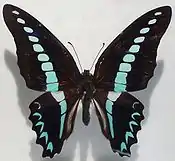
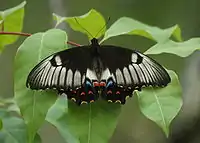



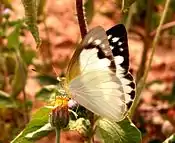
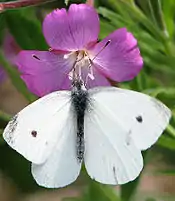
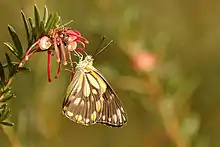
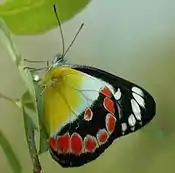

.jpg.webp)
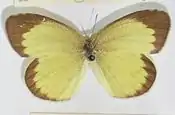
_mating_in_Narshapur%252C_AP_W_IMG_0776.jpg.webp)
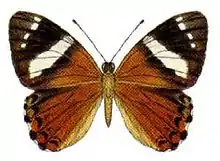
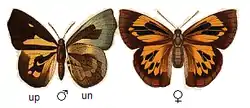
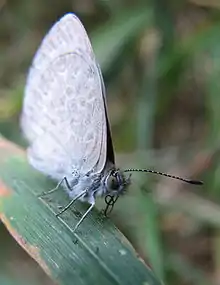

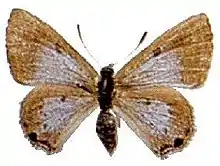
.jpg.webp)
.jpg.webp)
.jpg.webp)
.jpg.webp)
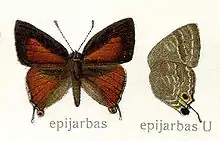
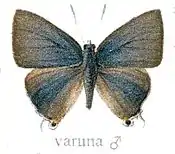

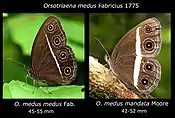
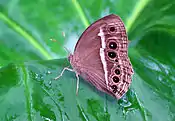


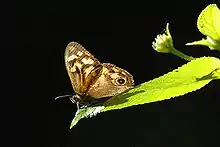
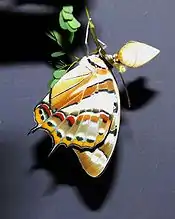

_mating_with_newly_imerged_butterfly_in_Hyderabad%252C_AP_W_IMG_9382.jpg.webp)
